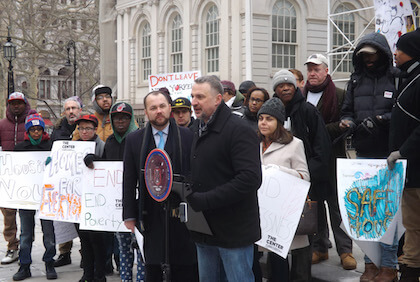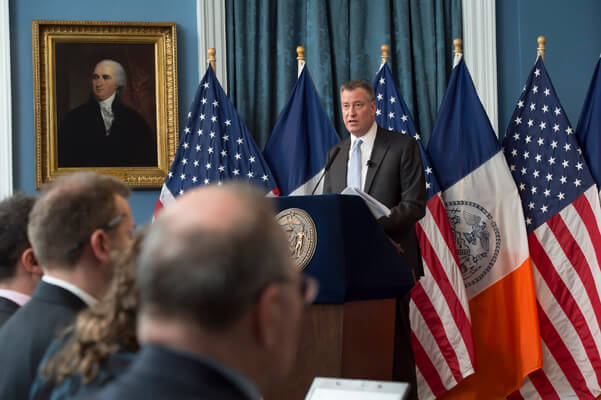So the Washington gay lobby, the Human Rights Campaign, endorsed Hillary Clinton. The middle-of-the-road LGBT rights organization endorsed the middle-of-the-road candidate.
The difference for the LGBT community between Senator Bernie Sanders and former Secretary of State Clinton isn’t over the issues. They both offer fervent support for the LGBT community, and in the Senate he co-sponsors the Equality Act broadly prohibiting discrimination based on sexual orientation and gender identity.
Nonetheless, the differences between the two and their candidacies are profound and deserve careful consideration.
The Long View
The Human Rights Campaign, just like a sister progressive organization, is fighting bitter battles. Planned Parenthood also supports Hillary. That group is fighting fabricated charges of selling fetal tissue and, in the fracas, state funding for its Texas health clinics has been cut off.
Meanwhile, HRC faces the kinds of challenges that recently got the best of our community in Houston. There, right-wingers libeled the LGBT anti-discrimination law with the insulting canard that it would allow men into women’s restrooms. The opposition twisted human rights into a smutty joke. In the referendum, a commanding 61 percent voted against LGBT rights.
These organizations are scared, very scared, of Republican attacks and believe Hillary is the strongest candidate. In their eyes, joined by many professionals, her moderate views offer the biggest tent — including left-wing Sanders voters, independents, and Republicans disgusted by the evangelicals and the Tea Party. She will gather a winning coalition, in their view.
To this way of thinking, supporting Bernie is reckless — he may offend independents and even conservative Democrats, and with a narrow base lose the election. His vulnerabilities loom large. Still unknown to most Americans, his enemies can distort his record with false accusations. Hillary is well known, not perfect, but a reasonable person who shrugs off right-wing hate.
But Hillary faces risks, as well. The email investigation has involved frequent leaks — attributed to “intelligence sources” (presumably not the FBI) — about the mishandling of secret files. More than 100 FBI agents are culling the files found on her private email server. In January, Fox News — hostile to Hillary for decades — said the agents wanted to investigate connections between her actions as secretary of state and contributions to the Clinton Foundation. The story died, only to have liberals revive it. On January 30, the New York Review of Books website posted a story citing official actions Hillary took involving entities that had contributed to her family foundation.
Her candidacy faces risks as great as those facing the Vermont senator.
Bernie Sanders is a combative idealist. Health care is a right — that should be free and available to all, like schools, libraries, and police protection. He freely admits his health care approach would raise taxes, so the question becomes whether voters will believe his promise that the increase will be more than offset by reduced insurance premiums. How will Sanders respond to accusations that the public will be forced to abandon existing health plans and accept a government takeover? These anxieties — not unreasonable given the uproar over Obamacare and Hillary’s health care reform efforts more than two decades ago — spur opposition to Bernie.
Bernie is not just a one-issue candidate: global warming, criminal justice reform, campaign finance overhaul, break-up of the big banks and overall Wall Street reform are signature issues of his, all with one common theme — inequality. Bernie promises to confront head-on a status quo where the richest get richer, and the rest fall behind.
And Bernie has taken the issue of inequality right to Hillary, quizzing her in a debate over what it means that she accepted more than $600,000 in speaking fees from Goldman Sachs since leaving the State Department. His campaign is based on the belief that Democrats must prove to voters that they are for the people and not for the rich.
The Republicans may nominate billionaire Donald Trump, who despite being bested in Iowa, still appears dominant in New Hampshire and beyond. By March, a second billionaire, Michael Bloomberg, may become a third party candidate; the former mayor is reported to be willing to put a $1 billion into a race, which would make him competitive with the resources Hillary is expected to be able to mount.
When one man can withdraw a billion from his assets and run for president, his influence casts a shadow on “we the people.” Bloomberg illustrates the unchecked power of great wealth. His gigantic campaign budget would represent less then three percent of his fortune. To put it another way, a household that had $60,000 in savings would be able to mount a $1,600 campaign for the presidency if it contributed the same portion of its net worth. Income inequality heightens political inequality.
Idealism empowers Bernie Sanders to go toe-to-toe with Republican attacks. Obama’s passivity to Tea Party fulmination distressed Democrats. Hillary Clinton responds with moderation, as well. She’ll let the “professionals” in the Justice Department judge the emails.
Bernie, in contrast, offers vigorous comebacks to claims he favors high taxes and a bigger government. The problem isn’t government, he argues, the problem is government captured by great wealth. Regulators become lapdogs because they use a revolving door to take corporate jobs after they leave government. Sanders will campaign for the public interest, providing a sharp contrast to Republican cuddle-the-rich policies.
Should Cruz build on his Iowa upset, Bernie would be even stronger, given the very narrow ideological base the Texas senator has.
The difference between a rigged game and an even playing filed is one Americans understand, and Bernie Sanders has the clean hands to make the argument. His approach is fresh, and he understands that many voters fear that the Democratic Party, like the GOP, is owned by the rich. Growing income equality and economic growth that is moving at the speed of a turtle make this the moment to draw the contrast Bernie illuminates His idealism is political realism. It offers a clear alternative to Republican prattle about taxes and big government, and gives him a mandate to transform the United States.


































